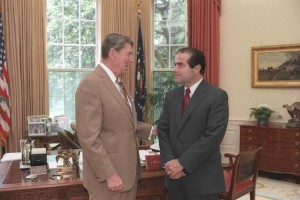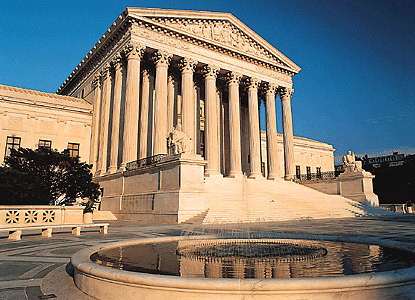Death of Antonin Scalia
Tuesday, February 16th, 2016February 16, 2016

In the oval office, U.S. President Reagan talks to Antonin Scalia while he was a nominee to the Supreme Court in July 1986. Credit: The Ronald Reagan Presidential Library and Museum/NARA
On February 13, U.S. Supreme Court Justice Antonin Scalia died at the age of 79. At the time of his death, he was the longest-serving justice on the court. He was appointed in 1986 by President Ronald Reagan. Scalia had a quick, biting wit and was seen as the intellectual leader of the conservative branch of the court.
Antonin Scalia was born in Trenton, the capital of New Jersey, on March 11, 1936, to immigrant Italian parents. His father was a language professor and his mother was a teacher. The Roman Catholic family moved to the borough of Queens, in New York City, when Scalia was a small child. Scalia received a scholarship to attend Xavier High School, a Jesuit military academy in Manhattan, where he excelled. (New York City Mayor Bill de Blasio ordered that his city’s flags be flown at half-staff to honor the fallen justice.)
Antonin Scalia completed his undergraduate studies at Georgetown University in Washington, D.C., and his law degree at Harvard Law School in Cambridge, Massachusetts. He practiced law for a few years before becoming a law professor, first at the University of Virginia and then at the University of Chicago. (Liberal U.S. President Barack Obama followed this same career path, studying law at Harvard and teaching law at the University of Chicago.) Scalia was made a judge for the United States Court of Appeals for the District of Columbia Circuit by President Ronald Reagan in 1982. In 1986, he was the first Italian American to be appointed a justice to the Supreme Court.
Scalia was a very conservative member of the court. He argued there was no constitutional right to abortion. He opposed gay rights, favored the death penalty and opposed gun control measures. Justice Scalia followed an “originalist” view when deciding cases. For originalists, the U.S. Constitution is fixed in the time it was enacted by the Founding Fathers. If no mention is made of an issue in the Constitution, originalists believe the issue is to be decided by the legislatures of the individual states and not by the Supreme Court.
Justice Scalia may have occasionally enraged and exasperated liberals, but he was admired by liberals and conservatives for his keen mind. Even so, the nation’s political landscape is fairly partisan (divided based upon political party) at this time. Scalia’s death has left the Supreme Court evenly divided between four liberal and four conservative justices. Republican legislators have threatened to block any nominee to the court put forth by President Obama, hoping that, if a Republican wins the presidential election, a conservative justice could be appointed in 2017.
Scalia was broadminded about political leanings in his private life. His closest friend on the court was another New Yorker, who also attended Harvard Law and taught law at the University of Chicago, liberal Justice Elena Kagan.
Other World Book article
- Bush v. Gore
- Conservation (1997) – A Back in Time article
- Court (1986) – A Back in Time article
- Supreme Court of the United States (1986) – A Back in Time article
- Supreme Court of the United States (1988) – A Back in Time article
- Supreme Court of the United States (1989) – A Back in Time article
- Supreme Court of the United States (2004) – A Back in Time article
- Supreme Court of the United States (2007) – A Back in Time article
- Supreme Court of the United States (2008) – A Back in Time article
- Supreme Court of the United States (2009) – A Back in Time article
- Supreme Court of the United States (2010) – A Back in Time article
- Supreme Court of the United States (2011) – A Back in Time article
- Supreme Court of the United States (2012) – A Back in Time article
- Supreme Court of the United States (2013) – A Back in Time article
- Supreme Court of the United States (2014) – A Back in Time article
- United States, Government of the (1986) – A Back in Time article



